Sarahbeth Caplin's Blog, page 43
September 20, 2015
Just surviving is a noble fight
I believe I’ve passed the age of consciousness and righteous rage,
I’ve found that just surviving was a noble fight
I once believed in causes too, had my pointless point of view
Life went on no matter who was wrong or right.
Billy Joel, Angry Young Man
It’s hard to believe that Dad died a year ago next week – mind-numbingly surreal. Where has the time gone? What was I doing? How many times did I think, I want to tell Dad this, only to realize with vein-freezing clarity that he is gone – really gone. Forever.
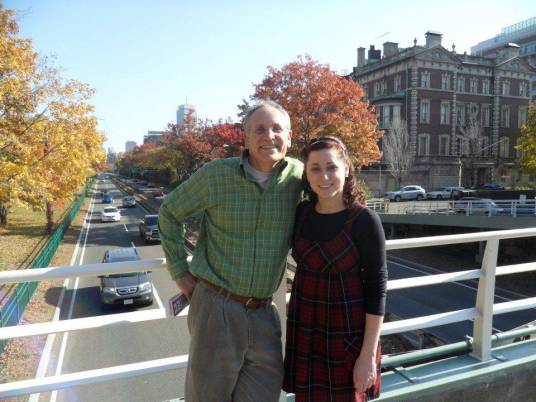 It has not been an easy year for me, and not just because of Dad – two months after his death I got married, moved into a new apartment in a brand new city where I didn’t know anyone, and immediately jumped into freelancing. The confounded adjustments of learning how to be a wife and start my life completely over added a deeper dimension to my grief. It was an entire way of life that I lost last year, though some of it was lost for the better – like my single status – but still it was a loss nonetheless.
It has not been an easy year for me, and not just because of Dad – two months after his death I got married, moved into a new apartment in a brand new city where I didn’t know anyone, and immediately jumped into freelancing. The confounded adjustments of learning how to be a wife and start my life completely over added a deeper dimension to my grief. It was an entire way of life that I lost last year, though some of it was lost for the better – like my single status – but still it was a loss nonetheless.
I didn’t grieve like a daughter of Dave Caplin should. I am not an eternal optimist like he was, and it was a struggle for me think positive even before the diagnosis of depression. I became like a zombie during the day, and chased PTSD out of my mind with Pinot Grigio at night. I’m amazed that Josh put up with me as he did. But by far the most satisfying thing I did for my grief was allow myself to get angry. Bitingly, nastily angry. Lashing out was my new drug. When a friend from church posted on Facebook how grateful she was that God apparently told her to move out of her apartment a week before it caught fire, I wrote this email to my friend Kerry:
I don’t get to say this too often because I know how insensitive it sounds, but I think you’ll understand what I mean. I grew up Jewish, so the Holocaust was an integral part of my Jewish education from a very young age. Also at a young age, my dad was diagnosed with cancer. A friend of mine killed himself, I got raped, and so on and so forth; my point being that I grew up with this awareness that the world isn’t always fair, and bad things happen to good and bad people alike, for reasons we just don’t know…
My father died of cancer because of genetics. Everyone in my family seems to die from cancer – we joke about the apparent “Caplin Cancer Curse.” Other people I know have had relatives miraculously healed from the same illness, because prayer. People prayed for my dad, too. Did those people just not have enough faith, then? Is that why those prayers didn’t “work”?So it really pisses me off that I’ve heard testimony after testimony from people who question God’s goodness for reasons like not getting that job, not getting that parking spot. Never mind the genocide that’s happened throughout history, and continues today, or that lady down the street suffering from cancer. As long as bad shit doesn’t happen to you personally, then God is still good. Privileged much?
When a friend mentioned this week that God is awesome because her last apartment caught on fire one week after she moved out, she called it a miracle. And the fire was in HER OLD BEDROOM! God told her to move at just the right time to avoid the fire, but fuck that person who moved in after her!
I made a smart choice to spill this rant to a student earning her master’s degree in counseling. She didn’t judge me, but she did recommend that I channel that anger into something more positive than hating people with good intentions. And you know what? My father would have said the same thing.
I have anger about a lot of things in life: anger at never pressing charges against my boyfriend. Anger that I let one insensitive comment from Dad about why I stayed in that relationship as long as I did keep us from speaking for nearly a year, wasting a huge chunk of time I didn’t know was limited. But most of all, I’m angry that I no longer have the solid faith that guided me through other stressful times, and helped me see the potential seeds of redemption to be sown in the turmoil.
But death is a loss that cannot be undone; there is no optimistic spin to put on that. And wishing I could revisit the past and do things differently accomplishes absolutely nothing.
Survival is indeed a noteworthy achievement. Moving forward is the ultimate success story.
Filed under: Other stuff








September 18, 2015
I hate celebrity memoirs
 There is a popular misconception that the memoir genre is self-indulgent. By definition, a memoir is about the self, but good memoirs connect a personal experience – be it substance abuse, a loss, or some other tragedy – with the larger human experience. You may never have experienced drug abuse, but the author could write her story in such a way that you identify with the feelings of loneliness that lead to her drug use. The narrative pulls you in the same way a novel would.
There is a popular misconception that the memoir genre is self-indulgent. By definition, a memoir is about the self, but good memoirs connect a personal experience – be it substance abuse, a loss, or some other tragedy – with the larger human experience. You may never have experienced drug abuse, but the author could write her story in such a way that you identify with the feelings of loneliness that lead to her drug use. The narrative pulls you in the same way a novel would.
I’m generalizing here, but celebrity memoirs don’t do that. They are the very definition of navel-gazing, and it’s giving the entire genre a bad name.
“Celebrity” is a very broad term, but here are a few reasons I think they tend to suck:
They tend to be ghost-written
‘Nough said there. What’s a memoir if not written in an authentic voice? That ruins it for me.
The subject is painted like a know-it-all
This is more common among Christian celebrity preachers: “Let Joyce Meyer show you how to persevere through difficult times.” “Let Joel Osteen show you how to reap God’s blessings for your life.” There are very few things I’ll ever call myself an expert in, because then there’s this expectation to perform that skill perfectly, and who does anything perfectly? Especially when it comes to faith?
When I write about faith, I write from a clearly biased perspective (though all memoirs are biased in their own way). Take whatever I write with a grain of salt. Take it with a dose of consideration, if you think it’s deserving. But for God’s sake, don’t take it as expert. I’m just one voice out of millions who thinks she has something worthwhile to say, but I’m still young, and could be talking out of my ass without realizing it. Twenty years from now I might cringe at Confessions and wish I waited, but I hope I never regret publishing it because of what it meant to me at the time.
The covers might as well be magazine covers
What’s more self-indulgent than a glamour shot with pearly-white teeth as big as my thumb nail? Is anyone else creeped out by book covers that stare at you from across the room? I don’t like sitting in Starbucks feeling like another patron’s book cover is watching me.
But the thing that annoys me most is the drive to dominate as many outlets as possible to make the most money, simply because they can. Not because they have a story to tell. Too often, a celebrity trying to write a book is like a tone-deaf person auditioning for American Idol – and becoming an idol of tabloid worship matters more than the art of storytelling.
“I believe there is hope for us all, even amid the suffering – and maybe even inside the suffering. And that’s why I write fiction, probably. It’s my attempt to keep that fragile strand of radical hope, to build a fire in the darkness.”
– John Green
Filed under: Other stuff, Writing & Publishing Tagged: celebrities, Christian culture, Christianity, memoir, Writing








September 17, 2015
Confessions of a Jew-‘ish’ skeptic
 If there’s any label that seems to fit me right now, it’s “Jew-ish skeptic” (obviously I made that up), though my “public label” is still “Christian by faith, Jew by heritage.” My father’s death last year brought up a whole series of questions I never let myself truly consider before (starting with hell, which snowballed to questioning God’s goodness, which only lead to more questions…). That was a twist in the journey that I never expected, and it’s been extremely stressful, to say the least. It’s exhausting to try to reconcile the good parts of Christianity that attracted me in the first place (the incarnation, ultimate redemption) with the not-so-good: eternal conscious torment (which I realize isn’t the only interpretation of hell out there, but it sure is a popular one). The division among Christians is more obvious to me now than ever before. Despite how great Jesus is, it’s other Christians that tempt me to run away, which makes me miss the wealth of diversity in thought that exists in Judaism.
If there’s any label that seems to fit me right now, it’s “Jew-ish skeptic” (obviously I made that up), though my “public label” is still “Christian by faith, Jew by heritage.” My father’s death last year brought up a whole series of questions I never let myself truly consider before (starting with hell, which snowballed to questioning God’s goodness, which only lead to more questions…). That was a twist in the journey that I never expected, and it’s been extremely stressful, to say the least. It’s exhausting to try to reconcile the good parts of Christianity that attracted me in the first place (the incarnation, ultimate redemption) with the not-so-good: eternal conscious torment (which I realize isn’t the only interpretation of hell out there, but it sure is a popular one). The division among Christians is more obvious to me now than ever before. Despite how great Jesus is, it’s other Christians that tempt me to run away, which makes me miss the wealth of diversity in thought that exists in Judaism.
But my theology has always skewed more toward Christian, even before I started using the Christian label. I finally decided to be honest with myself that my ideas of God and beliefs about humanity really weren’t Jewish. But the cultural pull of Judaism is still there, and still strong – I think Jewish culture says more about me than Christian culture ever did. I still go to church with my husband, but I also started going to Shabbat services at the Jewish Student Center on campus. I missed it. I miss having Jewish friends. And some part of me hopes that maybe going there will clarify some things for me, but I’m not sure what, exactly.
Well, maybe I’m a little bit sure. It’s a way for me to maintain a relationship with the history that brought me here, which is something I can’t easily forget. But the odds were stacked against me in my childhood: for every synagogue within reasonable driving distance in my hometown, there were a dozen more churches. And those churches, not so much synagogues, had youth-oriented programs that taught about God, which was all I was ever looking for. It makes perfect sense considering I was one of seven Jewish kids in a class of four hundred that I turned to the church for spiritual mentors and guidance, because that’s all that was available to me. And I’m one of hundreds, if not thousands of other American Jews facing the exact same conundrum. Jewish education is gasping for breath while Christianity continues to thrive, no matter what the fundamentalists say.
So how are Jews supposed to maintain a Jewish identity in a heavily Christianized culture? I’m probably the last person to answer that question, but my understanding of a “Jewish identity” is that it is an elastic one; there are so many diverse ways of nurturing it, and for me, I celebrate it in two ways: I continue reading my Jewish books, and I invest in friendships with other Jews.
The church may be my spiritual family, but there is something to be said about the bonds of a community that is bound not just in belief, but by blood. The Jewish culture is more than a group of people who enjoy matzo ball soup and gefilte fish, make awesome movies, use Yiddish slang, and kvetch about…well, everything. We are also bound by a common history of suffering, and it is truly miraculous by any standard that we are still here. That is a common ground where we all – orthodox, reform, agnostic or atheist Jews alike – can meet. My beliefs are very likely to keep changing as I get older, but I will never cease to be proud of where I came from.
Filed under: Religion Tagged: Christian culture, Christianity, evangelicals, Judaism








Checking reason at the door: Ken Ham and the fear of contradictory evidence
 When scientist Bill Nye debated Ken Ham of Answers in Genesis on creationism and evolution, both men were asked what it would take to change their stances. The answers could not be more different: Nye answered, “Evidence,” while Ham curtly responded, “Nothing.”
When scientist Bill Nye debated Ken Ham of Answers in Genesis on creationism and evolution, both men were asked what it would take to change their stances. The answers could not be more different: Nye answered, “Evidence,” while Ham curtly responded, “Nothing.”
In other words, no amount of contradictory evidence would move Ham to accept any creation narrative other than what the book of Genesis presents – and that account is to be taken literally.
Like many people who come to faith in adulthood, my scientific knowledge of the earth was more or less grounded: I certainly don’t understand how everything works, but I understand and accept evolution. Why? Evidence. And because my draw to Christianity had to do with grandiose ideas of ultimate redemption and a personal savior, I saw no need to scrutinize Genesis first to see if I could make my scientific knowledge fit before embracing the Christian label.
Quite honestly, I’m thankful that it happened this way: science first, theology second. I know a few atheists whose journey out of faith began when confronted with the evidence for evolution, and finding that evidence in favor of literal six-day creation came up short. The scientist starts with a hypothesis, and adjusts the hypothesis based on contradictory evidence. People like Ken Ham do the exact opposite: if it contradicts the Bible, they throw it out, no further investigation necessary. This does not seem like intellectual integrity. Furthermore, if the only way to keep your beliefs is to make sure they are never challenged, ever, you have a problem.
If you couldn’t guess it already, I’m not a part of the “God said it; I believe it; that settles it” crowd. I like knowing reasons for things. I like not looking like a moron if someone asks me why I believe what I do. But if I’m completely honest, I have to explain that Christianity won me over on emotional appeals rather than physical ones. And my ability to keep my faith rests more on whether a man who claimed to be the Messiah died and rose from the grave than anything else. Does evolution really mean there’s no way that Jesus rose from the dead? (If it helps sway your opinion, Timothy Keller, theologian and author of The Reason for God, argues exactly that)
To me, that grave being empty after three days is a bigger crux than how the world began, thousands of years before any of the prophecies were written. That is what I take on faith – no one has ever proven beyond any shadow of a doubt that the resurrection did not happen. But we do have a plethora of evidence for evolution, and it’s a bit insulting that people like Ham insist we must check reason at the door before we can claim Christianity.
If you have ever had to pit reason against faith, I’m curious to hear your stories.
Filed under: Religion Tagged: Answers in Genesis, Bill Nye, censorship, Christian culture, Christianity, Controversy, creationism, evangelicals, evolution, Ken Ham








September 13, 2015
When God talks like an abusive boyfriend
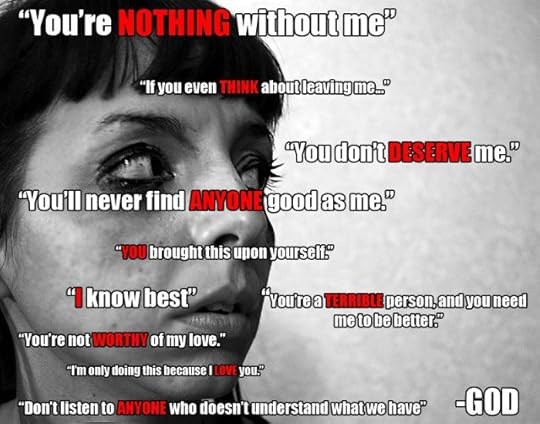 A friend who writes a blog about being an atheist in the Bible Belt recently posted this on Facebook:
A friend who writes a blog about being an atheist in the Bible Belt recently posted this on Facebook:
I have never heard more hatred spoken toward being human than I have heard in the lyrics of Christian music. The negativity is overpowering.
I have noticed this, too, but never mentioned it to anyone, thinking the real problem was me for “not getting it” or being too prideful. But the more I think about it, is it really necessary for the Christian to dwell on how depraved she is in order to praise how good God is? Isn’t God good just for the sake of being…God?
The worship songs are catchy, heart-stirring, and emotional, with lines that many people hear outside of church, Christian or otherwise:
“I’m nothing without you.”
“I’m not good enough for you.”
“How could you ever love someone like me?”
Aside from not being moved by crowds of people waving their arms and singing off-key in general, this is the next biggest reason why worship music doesn’t connect me with God: I have a problem when lyrics describing how God feels about me sound very similar to how my abusive ex boyfriend felt about me. If those lines above came from another human being, how many of us would feel an instinct to tell the person hearing them that she needs to leave?
Doesn’t it seem problematic that a person who hears this stuff from God won’t recognize it as a red flag if the same words come from a dating partner?
Whatever happened to the humble simplicity of lines like, “I once was lost, but now I’m found”?
The balance of a healthy self-esteem with a healthy awareness of my shortcomings has been a delicate one. There is a kind of Christianity that attracts abusers because it allows them easy access to forgiveness under the guise of grace (albeit cheap grace). At the same time, this kind of Christianity draws in victims of abuse because it reiterates the messages they are told every day, directly or indirectly: that they are nothing; that they are horrid and despicable; that no one could ever love them as they are. It is no surprise that this kind of Christianity enables victims to stay instead of building them up and encouraging them to pursue true freedom.
At the same time, there are other narratives of Christianity that have empowered victims of domestic violence that I’ve had the privilege of knowing. There’s a kind of Christianity out there that gently places a balm over old wounds by telling the survivor that she is loved the way she is; that she is worthy and has dignity. I can’t say which narrative is the “correct” one, but I’m inclined to believe it’s the one that endorses inherent worth and purpose, because no one I’ve ever heard of accomplished amazing things while still believing she is a wretch.
Filed under: Religion Tagged: Christian culture, Christianity, depression, grief, Spiritual Abuse








September 2, 2015
Saint Joan and me
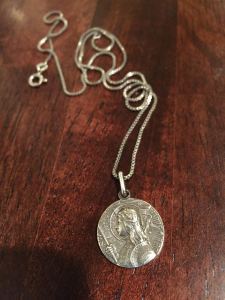 If I were not so intellectually honest, I’d admit that Joan of Arc would still fascinate me even if, after having lead a successful revolution, she retired from war duties and went on to live a conventional life, dying peacefully at home at an old age. But that’s not the complete truth. Most of us know Joan of Arc by her death at the stake before learning else about her, and with good reason: how many of us would face such an end with as much courage and composure as she did?
If I were not so intellectually honest, I’d admit that Joan of Arc would still fascinate me even if, after having lead a successful revolution, she retired from war duties and went on to live a conventional life, dying peacefully at home at an old age. But that’s not the complete truth. Most of us know Joan of Arc by her death at the stake before learning else about her, and with good reason: how many of us would face such an end with as much courage and composure as she did?
I collected books about her for a decade before finally traveling to her homeland of France. I was studying abroad in Italy at the time, and when spring break came around, I went ahead and booked that trip (and somehow convinced my mother to join me). It felt like more of a pilgrimage than going to Israel – oddly enough, at one point in time I wanted to be BFFs with this woman. Mom and I combined our limited memories of French to figure out the manual of the GPS in the dashboard of a rental car, and traipsed across the countryside to Rouen, the sight of two significant landmarks: the tower where Joan was imprisoned, and the memorial where she died.
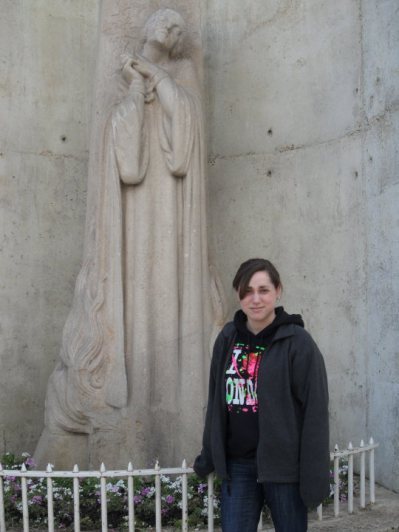
 As is often the case, visiting the sights of places I’ve read about, knowing I was walking the footsteps of this woman I so admired, changed things for me. I was older than the age Joan was when she was executed – nineteen – and wondered if I, then twenty-one, could endure the trials she faced. I lack the quick wit to answer the question “Are you in God’s grace?” with this golden quip: “If I am not, may God so place me in it; and if I am, may God so keep me.” Damn. I might have said whatever I assumed would keep me alive.
As is often the case, visiting the sights of places I’ve read about, knowing I was walking the footsteps of this woman I so admired, changed things for me. I was older than the age Joan was when she was executed – nineteen – and wondered if I, then twenty-one, could endure the trials she faced. I lack the quick wit to answer the question “Are you in God’s grace?” with this golden quip: “If I am not, may God so place me in it; and if I am, may God so keep me.” Damn. I might have said whatever I assumed would keep me alive.
It’s easy to see her as this warrior etched in stained glass; not as a frightened young girl I’d have anything in common with. When I think of what enabled her to have the confidence to proceed with her mission, I know that I want it. I want to know if I’ll ever be that certain about anything in life, and my place in it.When I wonder how solid my convictions actually are, I want (hopefully figurative) fires to show me what I hope I already know.
I may doubt what I believe right now, but I never doubted that Joan is the kind of leader I want to be. I wear my pendant from the museum in Rouen to remind me.
Filed under: Religion Tagged: Christian culture, Christianity








I don’t believe in ‘good people,’ but I believe in goodness
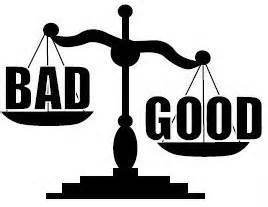 When Miley Cyrus appeared on the Jimmy Kimmel show wearing pasties, Kimmel asked her what her father would think of that outfit choice. Cyrus replied, ““My dad’s cool because I’m sure he’d maybe rather not have me have my tits out all the time, but he’d rather me have my tits out and be a good person than have a shirt on and be a bitch.”
When Miley Cyrus appeared on the Jimmy Kimmel show wearing pasties, Kimmel asked her what her father would think of that outfit choice. Cyrus replied, ““My dad’s cool because I’m sure he’d maybe rather not have me have my tits out all the time, but he’d rather me have my tits out and be a good person than have a shirt on and be a bitch.”
This isn’t a post about modesty (or lackthereof), but an idea that I’ve discussed before on this blog, and continue thinking about in my daily life offline: what is a “good person,” and who qualifies?
I’ve stated previously that I don’t buy into this idea of “really good people,” precisely because there are as many definitions of “good” as there are people. The “Good person/Bad person” dichotomy suggests some kind of scale in which we weigh our deeds, and who has time for that? Furthermore, wouldn’t our definition of “bad deeds” still be biased in our favor? “No, I shouldn’t have posted that mean tweet about my boss, but she is a bitch…”
I don’t think accepting that no one is truly “good” means that evil is the default. That seems like a heavy Calvinist-leaning idea, which I don’t buy into. Speaking for myself, realizing I’m not a “good person” means having a healthy awareness of my flaws, and recognizing that I sin on a daily basis. Even the people I know who seem like paragons of righteousness probably have battles within their hearts I’ll never know anything about.
I’m reminded of something C.S. Lewis says in his book Mere Christianity. He doesn’t dismiss other religious ideas as flat-out wrong, which I deeply respect. Instead, supposing that there is an Absolute Truth out there, some religions contain pieces of it, or come closer to it than others. The same goes for our own actions and attitudes towards others: I can think of a few people who are not Christian, but have a better understanding of Christ-likeness than many self-professed Christians do. Ergo, maybe it’s possible that some people are following Christ – or at least his teachings – without knowing it.
That’s something I thought about when someone in one of my classes at seminary raised the question of whether the Jews – God’s chosen people – are in hell because they “rejected” Jesus. You can imagine just how much I loathe this question, but my understanding is that the people who wrote the laws Jesus himself endorsed definitely know a thing or two about the character of God. I can’t elaborate very much beyond that, but I believe that God makes himself accessible in a multitude of creative ways, whether we recognize it or not. I’m thankful that it’s not my job to judge the condition of others’ hearts.
Filed under: Religion Tagged: Christian culture, Christianity, Controversy, Judaism








August 29, 2015
Lessons on death and grieving from The Lion King
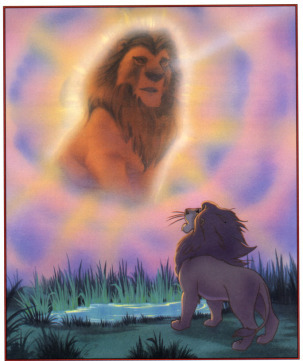 Here’s an uplifting opening sentence: I’ve been thinking about death lately. Our bodies have ways of reminding us of particularly painful seasons, and I recently realized that in my family, the start of Fall is a time marked by death: our first dog died in early September, my father in late September, the cat two weeks after that, and now my first kitty, almost twenty years old, is just barely clinging to life. For him it could be any day now.
Here’s an uplifting opening sentence: I’ve been thinking about death lately. Our bodies have ways of reminding us of particularly painful seasons, and I recently realized that in my family, the start of Fall is a time marked by death: our first dog died in early September, my father in late September, the cat two weeks after that, and now my first kitty, almost twenty years old, is just barely clinging to life. For him it could be any day now.
I guess it’s not so unusual that I’m thinking about this; and it’s somewhat ironic that this time is leading into Rosh Hashanah, the Jewish New Year. Between Rosh Hashanah and Yom Kippur, the Day of Atonement, you’re supposed to ask God to keep your name in the Book of Life another year. I haven’t practiced this in years, but now I feel somewhat superstitious about it.
I’m also thinking about the first time I learned about death. I don’t want to date myself by admitting how old I was when The Lion King came out, but I was quite young. Young enough to not quite “get” what death was all about, and at that point, I’d been spared from ever having to deal with it. The scene in which Simba has a vision of his father telling him to return to Pride Rock confused me – in my child mind, it was like Mufasa came back. He must have just been sleeping.
My father gently corrected me, and that scene is one of my earliest “traumatic” memories: being told that no, Sweetie, death is permanent. So it’s not like sleeping? Well, in a way…but it’s sleep that never ends.
That conversation made bedtime more of a chore than it already was. Now that my father is eleven months gone, I can’t get that moment out of my mind.
What’s the point of rehashing all this? I had a conversation with my therapist recently about the moments in which we feel we’ve grown up. For many people, adulthood happens much earlier than it’s supposed to. They are forced to take on the roles of grown-ups when barely out of childhood themselves. I, luckily, did not have a childhood like that.
My “growing up” moment happened at age fourteen, when a thirteen-year-old classmate committed suicide. We weren’t close at the time, but we used to be. He’d come over to my house and we’d climb this giant tree in my backyard, goofy eleven-year-olds that we were. By seventh grade we moved to different friendship circles, but still exchanged the occasional “Hey” between classes. His death was my first realization that bad things could not only happen in my small town of Glorified Suburbia, but they could happen to kids. Kids I knew.
But now that I think about it, the death conversation from The Lion King was a pivotal growing up moment. And sort of like in The Lion King, I had a dream not long after Dad’s death where I was driving through the valley that lead to one of our favorite breakfast locations: a tradition we cultivated in the last years of his life. Dad was in the backseat, which I thought was strange, and when I asked what he was doing back there, he said, “I can’t stay long. But you’re doing fine.”
I can’t stay long. But you’re doing fine.
I feel silly relating that grief-motivated dream to Simba’s vision, but in the same way that that vision motivated him to return home and make things right, so too did my dream of Dad motivate me to accept that things are sucky right now – and this won’t be the last season of sadness – but if I continue taking care of myself and moving forward, I’ll be fine.
I’ll be fine.
Filed under: Other stuff Tagged: cancer, depression, grief, Judaism








August 24, 2015
An ode to the art of innuendo
 Like many people, I used to think that traditional curse words signaled a lack of creative vocabulary. I’ve since changed my mind, though. Substitute words like “fricking,” “fudging,” or “eff” can be cute in certain contexts, but seem out of place in an adult novel, or even coming from the mouth of an adult. If you’re going to substitute a word that means the exact same thing, why not just say the real one?
Like many people, I used to think that traditional curse words signaled a lack of creative vocabulary. I’ve since changed my mind, though. Substitute words like “fricking,” “fudging,” or “eff” can be cute in certain contexts, but seem out of place in an adult novel, or even coming from the mouth of an adult. If you’re going to substitute a word that means the exact same thing, why not just say the real one?
But when talking about anything sex-related, we’ll do anything to avoid using the real words, from describing body parts to specific acts. Thanks to TV sitcoms and the advent of “That’s What She Said” jokes, even normal, non-sexual words like “vibrate” and “penetrate” are ruined for me, because I’ve heard them used in sexual contexts one too many times. Then I went and married the king of That’s What She Said jokes. Even my most innocuous statements get twisted into punch lines, which he finds hilarious, which means I have to try extra hard to twist his words around to get even.
One of our best “That’s what she said” moments happened at the Denver zoo. We walk past a Merry-Go-Round and I ask if he wants to go on it with me, because we’re such big kids. He responds, “Only if you ride the jaguar.” Without even thinking about it, I said “I’ll ride whatever you want,” and he had to sit down on the nearest bench because he was laughing so hard, his stomach hurt.
We are in our late twenties, and one of us turns thirty next month. Are we getting too old for this kind of middle school humor?
I have to laugh and say no. In this regard, we are only getting more creative in our attempts to one-up the other. How can I, as a lover of words, complain about that? Even if I find myself inappropriately cracking up at a friend who, staring at her pizza at a restaurant, says she doesn’t think six inches is big enough, the literary part of me can’t help thinking, The versatility of words is just so fascinating! But then I have to text my husband, Wait till you hear this one…and wonder if I’m just kidding myself, because I have reverted back to the mentality of a seventh grader. Well, if that’s the case, I know exactly who to blame!
I go back and forth in my head, thinking that words are arbitrary and constantly evolving, and on the other hand chastising myself for being part of a so-called movement to degrade the English language. But then again, people unfamiliar with Shakespeare would not believe the number of sexual innuendos in Romeo and Juliet, and not just between Romeo and Juliet! Romeo was a bit of a horn-dog who traded innuendos with his buddies, not unlike how men still do today (and yes, women too). And yet we hail this Shakespeare as some paragon of literary mastery. Yet not much has changed!
Personally, what I find most fascinating is that we can be constantly making up new sayings, and in the context of the moment, people still understand what we mean.
Filed under: Other stuff, Writing & Publishing Tagged: censorship, Controversy








August 21, 2015
Coincidence or redemption?
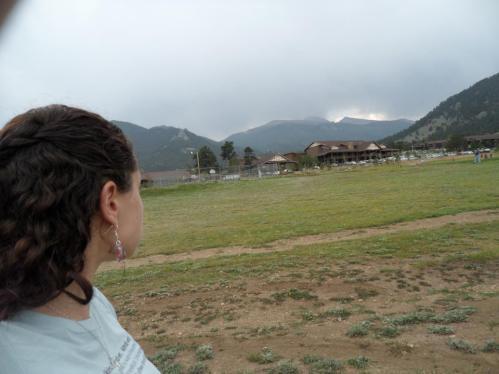 By now, many of my faith struggles are well-documented. I have few issues with Jesus, the man, but I’m still struggling with the thought of him being the only path to God (and was an agonizing crucifixion really the only way of atonement?). I can’t stomach the idea that people who follow the wrong doctrines can end up in hell. The Jew in me struggles to understand how this is “good news.”
By now, many of my faith struggles are well-documented. I have few issues with Jesus, the man, but I’m still struggling with the thought of him being the only path to God (and was an agonizing crucifixion really the only way of atonement?). I can’t stomach the idea that people who follow the wrong doctrines can end up in hell. The Jew in me struggles to understand how this is “good news.”
But I’ve had moments in my life – several, in fact – that more or less affirm the idea of brokenness to redemption, by far Christianity’s most beautiful feature. And if those moments point to the God of the bible as the God, I’m willing to continue learning all I can about him:
It was at his funeral that I met the sister of a friend of mine who committed suicide in middle school. She became one of my most treasured friends, and our friendship went full circle when she was there for me at my father’s funeral.
It was because of seminary, an environment that was toxic to my faith, that I met my first Colorado best friend, Kerry (though it did cost me a few grand to meet her, and I joke about whether she would have paid the same amount just to meet me. She still hasn’t directly answered that question).
And then, some maybe-miracle stories: it was while pushing myself out of my comfort zone through “cold turkey” evangelizing with my college church (I was horrible at it) that I ran into a man I recognized from Campus Crusade for Christ (or “Cru”). That man is now my husband. And when I attempted to raise money for a summer retreat in Estes Park, Colorado, I was five hundred dollars short a week before the payment deadline. It was my Jewish grandparents who footed the rest of that bill, knowing full well what that money would support. They didn’t believe in the cause, but they believed in me.
Last but not least, it was cancer that forced my dad to retire early so we could receive disability insurance, but allowed him to fulfill his true vocation (albeit on a volunteer basis): high school track coach.
Are all those examples nothing more than coincidence? Maybe. If it wasn’t the hand of God, I’m not one to put stock in the ability of “the universe” to line things up for me just so I can be happy (the universe seems a little big to be concerned with the personal goings-on of one species on one of an infinite number of planets, but that’s just me). But too many coincidences in a row, or even in a short number of years, just make me wonder.
Filed under: Religion Tagged: Campus Crusade for Christ, cancer, Christian culture, Christianity, evangelicals, hell, Judaism, Seminary












